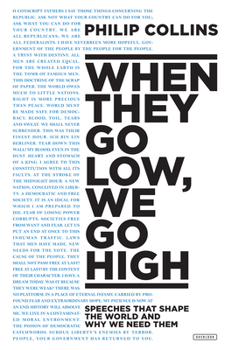When They Go Low, We Go High: Speeches That Shape the World and Why We Need Them
Select Format
Select Condition 
Book Overview
Can a good speech save democracy? "Anyone interested in the past, present and future of speeches and speechwriting will find this] a fascinating read." --The Spectator
When First Lady Michelle Obama approached the podium at the 2016 Democratic National Convention, nobody could have predicted that her rousing line "When they go low, we go high" would become the motto for the political left and an anthem for opponents of oppression worldwide. It was a speech with the kind of emotional pull rarely heard these days, joining a long list of addresses that have made history. But what was it that made this speech so great?
When They Go Low, We Go High explores the most notable speeches in history, analyzing the rhetorical techniques to uncover how the right speech at the right time can profoundly shape the world. Traveling across continents and centuries, political speechwriter Philip Collins reveals what Thomas Jefferson owes to Cicero and Pericles; who really gave the Gettysburg Address; and what Elizabeth I shares with Winston Churchill. In telling the stories of famous and sometimes infamous speeches--including those from Lincoln, Woodrow Wilson, JFK, Martin Luther King, Jr., Disraeli, Hitler, Elie Wiesel, Margaret Thatcher, and Barack and Michelle Obama--Collins breathes new life into words you thought you knew well, telling the story of democracy.
Whether it's the inaugural addresses of presidents or the revolutionary writings of Castro, Pankhurst, and Mandela, Collins illuminates and contextualizes these moments with sensitivity and humor. When They Go Low, We Go High examines the power of public speaking and serves as an urgent reminder that words can change the world.
"Hits on three unassailable truths: rhetoric and democracy must go hand-in-hand; democracy, for all of its flaws, is superior to tyranny; and democracy is currently under assault." --Paste
"Collins . . . understands intimately the mechanics of rhetoric. He believes that we, as human beings, possess the capacity to extract ourselves from the swamp in which we have sunk." --The Times





